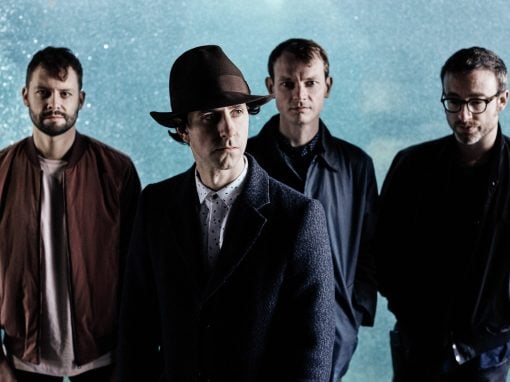Indie, charismatic and Geordie. Well, we couldn’t be talking about anyone other than Maxïmo Park.
Undoubtedly, Maxïmo are one of the pinnacle bands from the noughties indie-rock scene, and even the current indie-rock scene. Having created music since I was a “wee bairn”, back in 2000, and having five – soon to be six – full-length albums under their belt, both their discography and musical commitment set them aside from the rest.
And, of course, their sound. Whether it’s the versatile vocals of Paul Smith – to the point where he’s flitting in and out of belting out a chorus, to performing a venomous spoken word – or the multiple weird and wonderful techniques used by the band, they’re doing something right. But with four UK top 10 albums, two gold ones and one nominated for the Mercury Prize – I don’t think I have to justify myself. And as they’re heading to us – well, almost, they’re playing the O2 Institute in Birmingham – on May 5, you don’t have to take my word for it either.
We caught up with lead singer Paul Smith about their pre-show rituals, time on the road and what to expect from their new album, Risk to Exist – released April 21.

I last saw you in Newcastle on your 10th anniversary of A Certain Trigger tour, what’s changed since then?
We made a record in Chicago! We had already started writing it before our 10th anniversary tour, but wanted to do a few dates to celebrate surviving for this long in the fickle world of pop… In terms of how our sound has changed, the new record is more spacious and pretty groovy I have to say! We’ve always written from a political standpoint within our music but this album is more explicit in its political themes.
Obviously you’re heading out on tour again very soon, what can fans expect?
We have a reputation for energy and passion especially in my delivery of the songs, so there’ll be no shirking in that department. As always, we strive for the perfect blend of old and new songs to make sure that we are invigorated on stage and that the audience goes away entertained. It’ll be interesting to see how people react to the new songs. We played some of them in Germany for a TV show a few weeks ago and people were dancing even though they didn’t know the songs so that was very encouraging!
You’ve been touring for so many years now, how do you make sure your sets stay interesting and every show is a bit different?
Some bands seem to have pre-prepared things that they say to the audience but we react to how we feel in the moment. Every crowd and every room is different and we enjoy the opportunity to visit different cities. We aren’t locked inside our tour bus (!) and if we have a good day then that is reflected in the concert that evening. Conversely, if you have had a bad day then the concert is a way of releasing your energy. As I say, we try to play a lot of different songs and change them every night so that we can stay fresh. We are relearning some of our older songs that we haven’t played for a number of years – that should be interesting!
Any pre-show rituals? What’s on your rider?
I do a lot of unusual sounding vocal warm-ups! We try to have healthy things on our rider these days but when we’re in Germany they tend to give us fantastic chocolate. We always have some local postcards and stamps so that we can send little dispatches back to our family and friends.

Risk to Exist is almost out, can you give us a bit of a feel of the album?
We recorded it live and it feels like we’ve captured some of the feel of our concerts but with this new space in the arrangements that I hinted at earlier. We have the amazing Mimi Parker, from the band Low, singing on five of the songs, as well as a horn section on a few. There are some big subject matters dealt with in the lyrics, like the migration crisis, for example, but always from a personal perspective. We’ve always written songs from the heart so even though there might be political implications to the lyrics they are still down-to-earth and have a universal aspect to them.
How was working with, producer, Tom Schick on the album?
He was very easy to work with and we were inspired by his previous recordings of Wilco, who he’s best known for producing, but also artists like Rufus Wainwright and Parquet Courts. He would tell us when we needed to stop playing and just listen to some of the first takes that we did, because they ended up being the best performances.
You’ve already got four U.K. Top 10 albums, how did it feel each time you found out you’d made it into the Top 10? Do you reckon Risk to Exist could join those four albums?
It’s always a bit of a buzz because we love pop music, and the charts were always very important when we were growing up. On the other hand, you have to keep it in perspective and many of the greatest records that we know of did not chart highly!
As for the new record, we try not to get too far ahead of ourselves because that would lead to potential disappointment… But with publications like your good selves spreading the word, you never know!
Did any of you go to university- what was your time like there?
We all graduated from university in Newcastle. I ended up staying and doing a Master’s degree in The Americas: Societies, Histories and Cultures. I enjoyed being at University although my Bachelor’s degree was a bit dull because part of it was in linguistics, which was more scientific than I’d hoped! I also did drawing and art history as part of a combined degree and those parts were really great.
And what’s some key advice you’d give students who are either in a small band, or wanting to start up a band? How can they get noticed?
Be yourself. Don’t mimic another band or singer. Try and find out what makes you stand out from the crowd.





